Excellences of Infineon‘s three phase BLDC driver chip
Time:2024-01-09
Views:388
Brushless DC motors (BLDCs) are widely used due to their advantages of long lifespan, less maintenance, and high efficiency. Based on this, BLDC is widely used in DIY and professional battery powered motor products, such as electric tools, gardening tools, commercial and consumer multi axis aircraft, battery powered household appliances, robots, low-speed electric vehicles, etc. These products use different types of motors and control strategies, so their voltage, torque, product specifications, etc. are not the same. Is there a universal control chip to achieve control of different motor products?

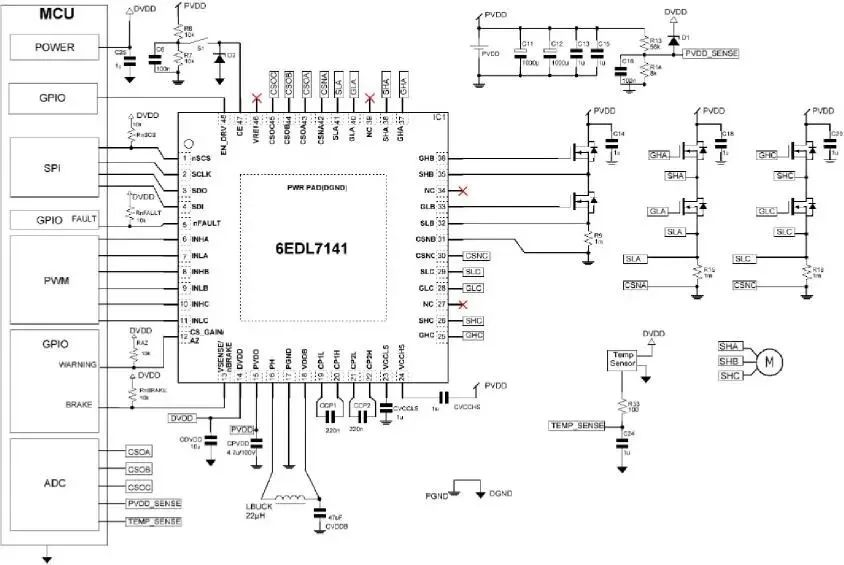
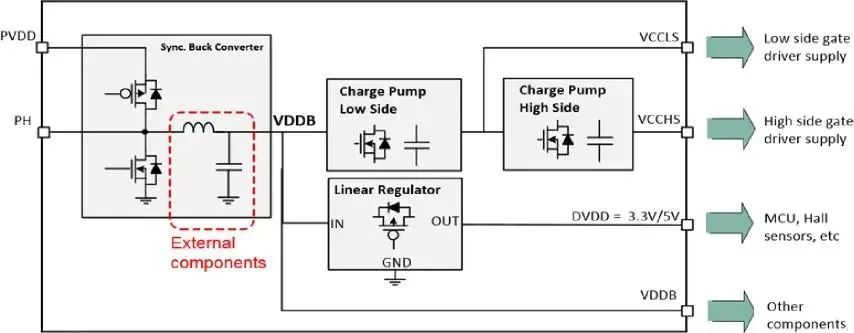
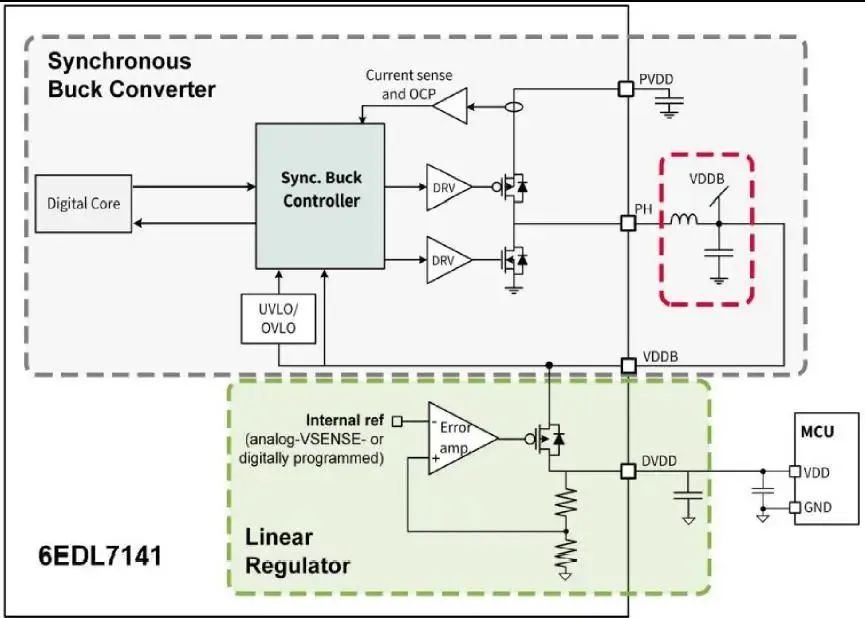
Yes, this is Infineon‘s new three-phase motor intelligent drive chip 6EDL7141, which is an intelligent three-phase motor control gate driver that can be used for battery powered motor control applications in various occasions. The 6EDL7141 gate driver supports battery powered applications at 12-48V levels. This chip has fully programmable design capabilities and can achieve various PWM control and braking mode control through a large number of parameter configurations. It also has complete protection functions, such as overcurrent, overheating, and locked rotor detection.
Next, we will learn about the overall architecture, characteristics, and innovative gate drive capability of this three-phase motor intelligent drive chip. Through its GUI tool, it is easy to design and debug online. At the same time, the existing reference evaluation board can also enable designers to quickly achieve product design and accelerate the product launch cycle.
Product Overview
MOTIX TM 6EDL7141 is the latest three-phase motor control gate driver IC launched by Infineon for battery powered BLDC motor control. 6EDL7141 can be used to develop high-performance battery powered products using BLDC or PMSM motors, with applications including wireless power tools, horticultural power products, and automatic guided vehicles. MOTIX TM 6EDL7141 has over 50 programmable parameters using SPI interfaces, which can be fully parameterized to drive various MOSFETs and achieve optimal system efficiency.
MOTIX ™ 6EDL7141 adopts a 48 pin VQFN package, which has great flexibility. Its operating voltage is 5.5-60V, and it can be configured with gate drive current and pull-up current, up to 1.5A, effectively driving various MOSFETs to perfectly fit various application scenarios. Thanks to the built-in dual charge pump, its gate driver power supply voltage can be set to 7V, 10V, 12V, or 15V, which can be adjusted even at low battery voltage. MOTIX ™ The parameters of the 6EDL7141 gate driver can also be adjusted to control the voltage swing rate to minimize electromagnetic interference in the system. MOTIX ™ All settings of 6EDL7141 can be quickly changed through a simple and easy-to-use GUI.

Figure 1 Control Application Diagram of DC Brushless Motor

Figure 2 6EDL7141 Typical Application Principle Diagram
Rich power architecture
The integrated voltage regulator only requires an external capacitor and inductor to power the microcontroller and Hall sensor in the motor, further reducing the peripheral devices and required PCB space. High performance electric tools typically require the use of precise ADC reference voltage for high-precision current measurement. MOTIX ™ 6EDL7141 adopts an advanced linear power regulator architecture, powered by an internal buck converter, which can provide the best signal quality under any input and output conditions while optimizing power efficiency.
As can be seen from Figures 3 and 4, MOTIX ™ The 6EDL7141 integrates an efficient synchronous Buck DC-DC converter internally to provide high-voltage power supply for the entire system, with an input voltage range of 5.5-60V. If the PVDD is ≥ 9.5V, the VDDB can provide up to 600mA of current. At the same time, an LDO regulator powered by the Buck converter output can provide up to 300mA of low-noise digital power supply. As a system level design, it is possible to flexibly choose the power supply method, such as Buck or LDO output to power external components (MCU, Hall, etc.), providing power to the matching MCU, thereby eliminating the need for power configuration.

Figure 3 Internal power management architecture diagram of 6EDL7141 chip

Figure 4 Internal power management architecture diagram of 6EDL7141 chip
Adjustable gate drive parameters
The power supply in the system is provided by a voltage regulator, which provides bias power for all three-phase high/low end drivers. The three-phase gate driver based on charge pump supports 100% duty cycle output, and thanks to the dual charge pump design, its gate driver power supply voltage can be set to 7V, 10V, 12V, or 15V through SPI parameters, allowing the driving of standard level MOSFETs even at low battery voltage. The high and low side gate level driving capacity can reach up to 1.5A, with built-in adjustable driving current design, which is also adjusted through SPI parameter settings. It can be combined with Infineon‘s MOSFET to achieve the best efficiency of the system and achieve different power level applications.
In addition to the ability to select gate driver pull current and fill current, 6EDL7141 has innovative and unique drive conversion rate control functions, which optimize EMI and switching losses in battery powered applications by controlling the rise slope and rise/fall time of the gate drive voltage. Dynamically optimizing dv/dt can use MOSFETs for optimal performance. This can greatly reduce switch losses and facilitate an increase in operating frequency.
PWM mode and braking mode
6EDL7141 offers four different PWM modes and a variant mode to meet different MCU requirements. The first mode is the 6 PWM mode, which drives the gate driver in the most classic way by using 6 PWM signals from the MCU.
6EDL7141 also has three other modes to simplify PWM generation on the MCU side through intelligence. These, along with integrated protection functions, bring high reliability and faster development processes to drive applications. Intelligent dead zone time control will ensure that breakdown will not occur under any circumstances. The highly configurable braking mode provides safe response to motor or system events. The different PWM modes are set through SPI.
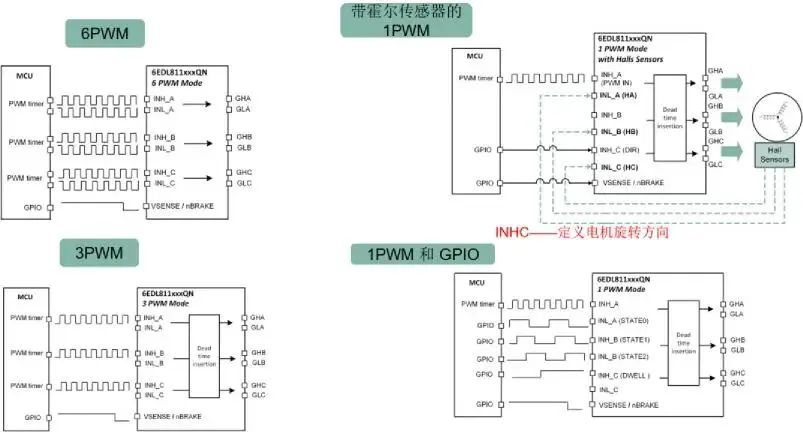
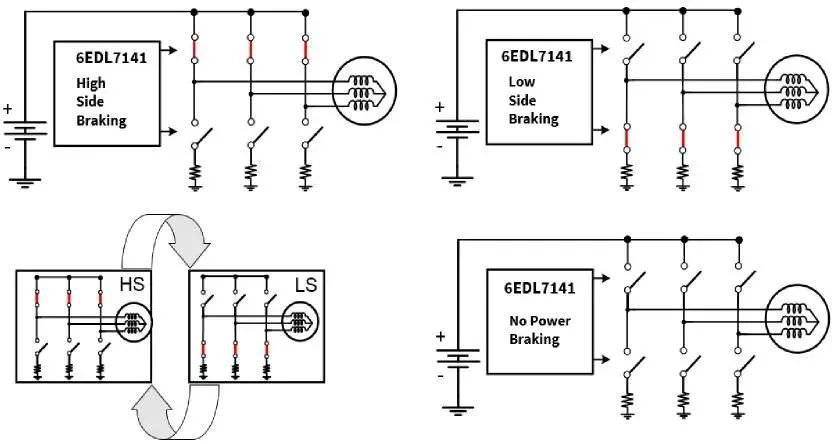
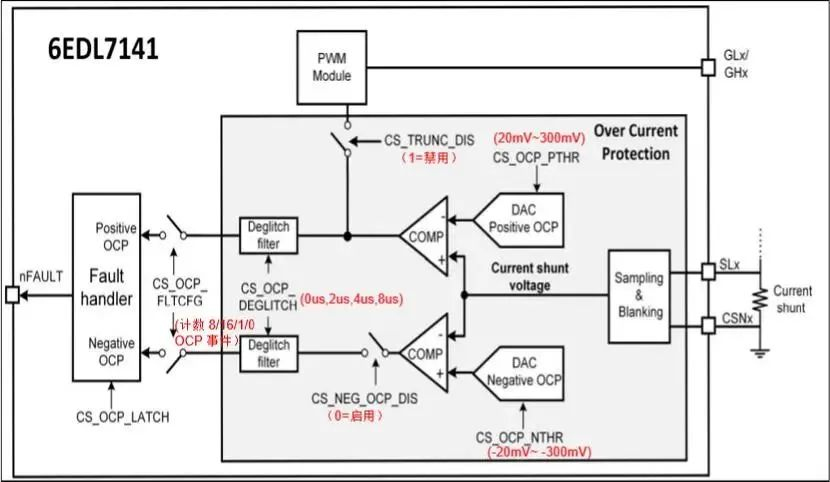
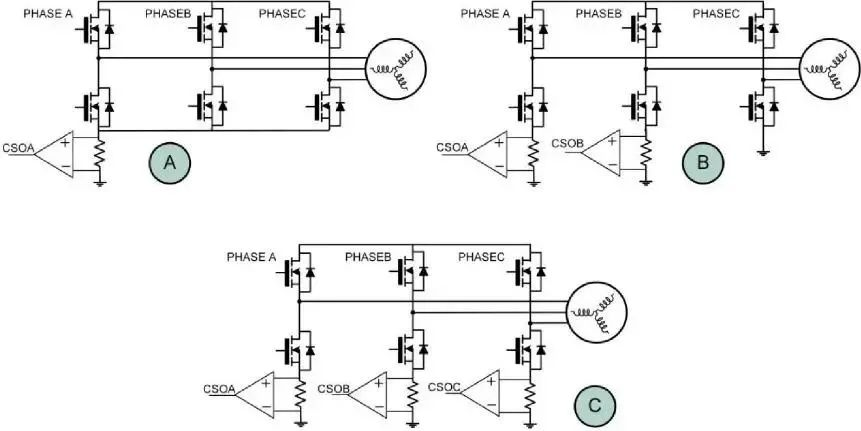
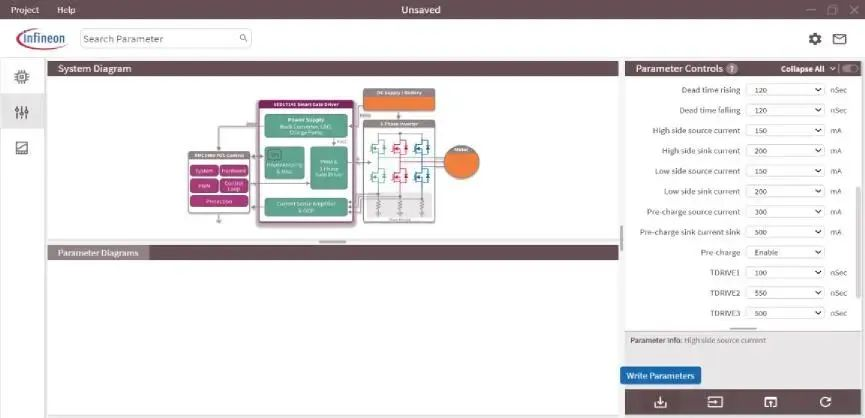 Infineon is now providing an evaluation version of EVAL for this three-phase intelligent driver_ 6EDL7141_ TRAP_ 1SH, this motor drive board is designed for battery powered brushless DC (BLDC) motor drivers with trapezoidal wave control, used in wireless power tools and other applications. This evaluation board is used in conjunction with a motor containing an integrated Hall sensor for rotor position sensing, combining the XMC1400 series microcontroller with the 6EDL7141 three-phase intelligent driver IC and Infineon power MOSFET. From the design of the evaluation board, it can be seen that due to high integration, 6EDL7141 reduces the number of system components and market time, while significantly improving power density, system performance, and peak power pulse capability.
Infineon is now providing an evaluation version of EVAL for this three-phase intelligent driver_ 6EDL7141_ TRAP_ 1SH, this motor drive board is designed for battery powered brushless DC (BLDC) motor drivers with trapezoidal wave control, used in wireless power tools and other applications. This evaluation board is used in conjunction with a motor containing an integrated Hall sensor for rotor position sensing, combining the XMC1400 series microcontroller with the 6EDL7141 three-phase intelligent driver IC and Infineon power MOSFET. From the design of the evaluation board, it can be seen that due to high integration, 6EDL7141 reduces the number of system components and market time, while significantly improving power density, system performance, and peak power pulse capability.
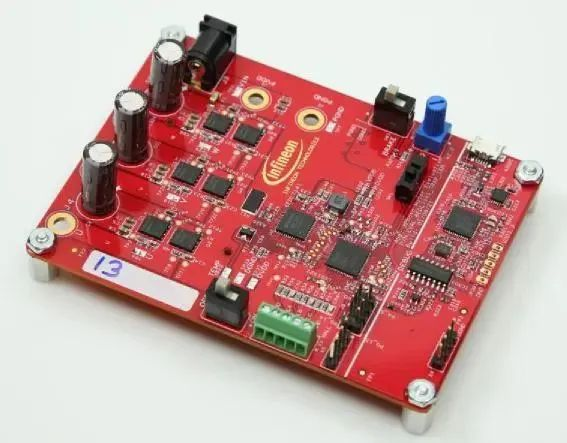

Figure 5: Four Different PWM Modes
When braking, 6EDL7141 will set the gate driver output to a predefined state when a braking event occurs. When integrated with XMC1400 or other MCUs, the system‘s reliability can be improved through dual internal and external braking. External braking is handled by any other fault source in the external MCU or system. 6EDL7141 provides the following braking modes, as shown in Figure 6.
//High side braking - all upper pipes are conductive, and the lower pipes are turned off
//Low side braking - all lower pipes are conducting, upper pipes are turned off
//Alternating braking - alternating between high and low side braking
//High impedance - all outputs are set to high impedance
The issue of direct connection of inverters requires extreme attention, and intelligent processing of dead time is also an effective means to prevent device direct connection. The dead time of 6EDL7141 can be programmed, and the rising edge dead time and falling edge dead time can be independently programmed (achieved through SPI). When editing and setting the dead time, it is necessary to ensure that the dead time is sufficient to meet the requirements of the conversion rate configuration and the selected MOSFET.

Figure 6 Braking Mode

Figure 7 6EDL7141 Built in Protection Logic Details
6EDL7174 integrates three operational amplifiers with adjustable offset and gain, which can be used to measure the current in the inverter through shunt resistors. As shown in Figure 8, it supports single, dual, or triple group shunt detection. A Hall sensor comparator with three adjustable anti spike pulse functions can achieve adjustable protection parameter settings to adapt to different system powers and fault protection threshold settings.
Among them, OCP overcurrent protection is an extremely important protection feature in motor applications. The internal OCP comparator mechanism of 6EDL7174 has integrated high-precision DAC reference voltage, positive and negative OCP functions, PWM cutoff, anti spike pulse timer, fault triggering event configuration, etc. Of course, OCP overcurrent protection also exists in the following positions: such as shunt or Rdson, DVDD, LDO OCP, step-down converter OCP, etc. At the same time, the UVLO powered by the chip is also not missing, such as the undervoltage locking protection of PVDD, gate driver power supply, DVDD LDO, as well as the system level over temperature alarm and protection shutdown, configurable watchdog, rotor locking detection based on Hall sensor input, and memory failure, all of which together achieve systematic integrated protection for motor control, improving the reliability of the motor system.

Figure 8 supports single (A), double (B), and three (C) parallel current detection configurations
The response to fault protection can also be configured through software, such as braking, high resistance, latching or non latching faults, to meet different application requirements.
Graphical User Interface (GUI) Tools
Infineon provides GUI tools for motor drive control design, allowing users to select devices and configure parameters freely through the GUI interface. These can be visualized through parameter writing, greatly simplifying and saving design time. The adjusted parameters can be stored in OTP. After completing the OTP operation, some configurations can also be changed through the SPI command. 6EDL7141 provides up to 50 parameters that can be configured through SPI.
By utilizing GUI and SPI, even non professional motor control designers can easily design excellent motor control systems using 6EDL7141.

Figure 9 Infineon Motor Control GUI
Evaluation board accelerates the design and listing process
The evaluation board has fully configurable operating parameters, integrated and configurable onboard power and gate drive outputs, and configurable protection modes. Built in debugger, directly connected to USB for debugging, the evaluation board can run independently or run through Infineon motor control GUI.
This evaluation board has a DC input voltage of 12 V to 24 V, a rated voltage of 18 V, a maximum input current of 30 A, and a peak operating power of up to 500 W. It can be used as a reference for the design of motor control applications, including cordless electric tools, horticultural products, automatic guided vehicles, electric bicycles, drones, and battery powered robots.

Figure 10 Evaluation version EVAL_ 6EDL7141_ TRAP_ 1SH
Infineon‘s three-phase intelligent motor gate driver 6EDL7141, with complete integration and multiple integration functions, can significantly reduce the number and cost of external components, including built-in power converters, intelligent drives, sensor detection, comprehensive protection to improve reliability, configurable parameter implementation, providing convenient and fast design for battery powered motor drive applications, shortening product design and development cycles and market time.|
Disclaimer: This article is transferred from other platforms and does not represent the views and positions of this site. If there is any infringement or objection, please contact us to delete it. thank you! |











